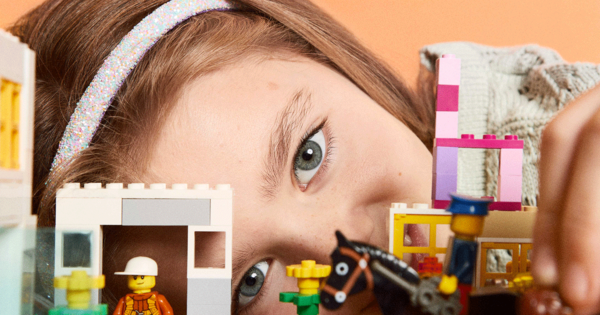
Girls are facing a crisis of creative confidence, according to new findings from The Lego Group. Ahead of International Women’s Day (March 8), the brand launched a major initiative highlighting how language bias and the pressure of perfection can stifle girls’ creativity.
The second installment of Lego’s “Play Unstoppable” campaign, which aims to challenge gender stereotypes and empower girls, comes after the brand commissioned global research into the societal trends affecting children’s creative confidence. The study—of more than 61,500 parents and children between five and 12 years old across 36 countries—revealed that girls’ confidence in their creativity declines as they get older.
Their declining confidence can be compounded by two prevailing issues: everyday language and the expectation to be perfect. Two-thirds of girls said the language they hear can make them feel like they shouldn’t experiment and make mistakes, while three in five girls reported feeling pressured by society’s messages of perfection.
The majority of parents also noted that gendered descriptions are commonly used to assess the creative outputs of male versus female creators, with terms such as “pretty,” “cute” and “beautiful” commonly attributed to girls, while words such as “brave,” “cool” or “genius” are more often applied to boys.
For Lego, these findings are significant, as it sees itself as a champion of creativity. More than three-quarters of girls aspire to work in creative industries, per the study, which underscores the need to support and cultivate their creativity for the long term, said Alero Akuya, vice president of brand development at The Lego Group.
Lego illustrated the research findings in a film, “More Than Perfect,” which sets up an experiment among girls and their parents. In the first scenario, girls are told to build a “perfect” playground with Lego bricks, and they hesitate over their projects.
In the second challenge, they’re invited to build “any” playground, with “no right or wrong.” The outcome is “instantly light-hearted,” Akuya observed. “They’re even collaborating better. There’s an air of freedom.”
“This shows that even with a slight change in language choice, you can create such a meaningful impact with kids,” she added.
Supporting parents
Along with resonating among girls, Lego’s campaign wants to aid and equip parents. It will unfold through five initiatives supporting kids and families.

